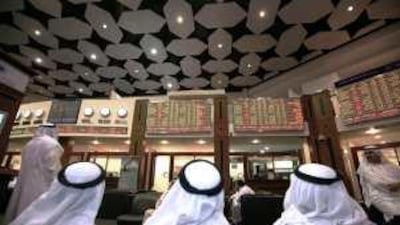Dubai stocks tumbled Wednesday as credit ratings agencies issued fresh warnings about risks to the emirate's economy from falling property prices and deteriorating banking assets. Emirates NBD, the country's largest lender by assets, fell to a three-month low after it was downgraded by Standard & Poor's (S&P). The credit ratings of Mashreqbank and Dubai Islamic Bank, the country's largest Islamic lender, were also cut by S&P as another ratings agency, Moody's Investors Services, warned that banks across the UAE are being forced to renegotiate and restructure loans with their clients. "Almost every single bank we talk to in the UAE is seeing an increased occurrence of renegotiating and restructuring loans, often with family-owned businesses," said Mardig Haladjian, who heads Moody's GCC bank coverage. Dubai stocks were among the world's worst performers yesterday, falling 3.4 per cent and taking total losses since the market hit its 2009 peak last month to more than 20 per cent. Regional stock markets led global declines as oil continued its slide and the leaders of the Group of Eight industrialised nations resolved to continue economic stimulus until a global recovery is assured. Moody's, which rates 16 UAE lenders, is stress-testing banks with a focus on name lending, which is based on reputation rather than financial criteria. The move was triggered by the financial restructuring of the family-owned Saad and Al Gosaibi groups in Saudi Arabia. "The risks to Dubai's economy have, in our view, increased," S&P said. "The economic slowdown, stock market decline and dropping real estate prices are raising significant hurdles for these Dubai-based banks. "Looking forward, we expect these factors to significantly slow business growth and lead to a deterioration in asset quality and profitability." S&P warned it may further downgrade the banks if their financial profiles, asset quality or capital ratios were further affected. UAE banks are generally considered to have solid capital buffers compared with their western peers, some of which have been forced into insolvency since the collapse of Lehman Brothers last year. But local banks have struggled to raise fresh funds after international banks started to withdraw capital from regional markets last autumn. S&P pointed to Dubai's strong dependency on property and construction, which accounts for roughly half of its economy. Some analysts expect property prices to fall as much as 70 per cent by the end of the year from their peak last year. The federal and Dubai governments have given strong support to banks by injecting fresh deposits and offering an emergency credit facility, but banks are still struggling to raise funds. S&P said it expected banks' loan books to severely deteriorate despite recent moves by the Government to recapitalise local lenders. "While these various measures represent important mitigating factors, we nevertheless expect the deterioration in banks' asset quality to be material," it said. A five-year economic boom fuelled by oil income and cheap foreign funds came to an abrupt halt last autumn, when the financial crisis hit the region. Last week, the Federal Government offered to guarantee bonds as another way to encourage banks and other companies to gain access to capital markets. S&P said it would keep Emirates NBD, Mashreqbank and Dubai Islamic Bank on negative outlook, which means there could be another downgrade in the future. Ratings affect the ease with which banks can borrow funds and higher ratings usually allow them to pay less interest. Meanwhile, Moody's yesterday cut the credit rating of Jebel Ali Free Zone's Dh7.5 billion (US$2.04bn) sukuk to "A2" from "A1". Moody's cited financial challenges faced by Dubai World, its parent company. Nakheel, another unit of Dubai World, has already entered restructuring talks to refinance its $3.5bn Islamic bond due in December.

Bank downgrade hits local stocks
Emirates NBD, the country's largest lender by assets, fell to a three-month low after it was downgraded by Standard & Poor's (S&P).
Most popular today
